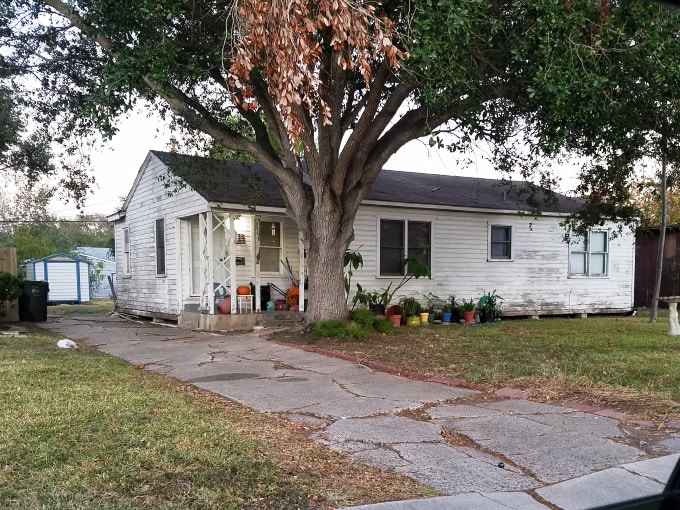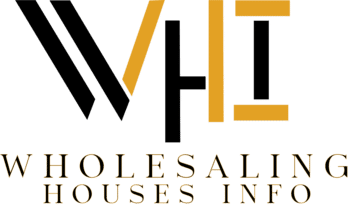What is Wholesaling Houses?

Real estate wholesaling is one of the lesser understood and least leveraged methods of investing in real estate. But, many wealthy investors in the United States earn a great deal of profit using real estate wholesaling.
This article explains what is wholesaling houses and highlights the benefits of wholesaling houses as well as answers the question: Is wholesaling houses easy?
Table of Contents
What is Wholesaling a House?
Wholesaling houses is a real estate investing strategy that many new investors utilize. It is a very low risk and high reward strategy. One in which no experience or personal capital is needed.

What are the Benefits of Wholesaling Houses?
Some of the added benefits of wholesaling houses include the following:
You can get started quickly
A key benefit of wholesaling houses is the ability to make a good profit without risk. It is also easy to get started and does not require formal education or any type of real estate license.
You will be paid faster
There are no barriers to entry in real estate wholesaling. The process from start to finish is quick and simple.
High ROI
Unlike real estate agents and property managers, real estate wholesalers have the ability to control their own ROI. Wholesalers have the luxury of deciding whether they want a 1%, 10% or even 50% return.

How Does Wholesaling Houses Work?
Its simplicity is perhaps the most appealing factor to investors. The following are the 4 basic steps to wholesale real estate:
- Market for motivated sellers – The first step in wholesaling houses is to find properties that can be acquired at a deep discount. In order to find these types of properties you must generate motivated seller leads. The more seller leads you generate the better chance you have at securing a deal.
- Get a property under contract – Present a motivated seller with a cash offer. Once a motivated seller accepts your cash offer, you need to get the seller to sign a Purchase and Sale agreement. When you are new to real estate wholesaling, it will be easier to start wholesaling houses with a simple one page purchase contract. Before getting a property under contact, make sure you read and fully understand the contract. Also be aware that real estate contracts and disclosures vary from state to state. Make sure the contract you use incorporates terms that are allowed in the state you are investing in.
- Assign the contract to a cash buyer – Now you market your property to a cash buyers list. You should be able to find a buyer fast as long as the numbers make sense. There are other variations of wholesaling too. Some wholesalers may assign and “flip” their contracts; others may decide to double close. Alternatively, investors may “prehab” the property, meaning the wholesaler (you) may touch up or clean the property to increase the likelihood of a higher profit.
- Close the deal – Last you need to send your purchase contract and assignment contract to an investor friendly title company. The title company will then get all the required documents prepared for closing. After the closing process takes place, the seller will receive their proceeds, you will receive your assignment fee, and the buyer will receive the keys to the property.
Conclusion
Wholesaling houses is a highly effective way to get started in real estate investing. Real estate wholesaling requires little to no cash or experience. It is by no means however, a “get rich quick” hack. It takes a lot of hard work and dedication.

Take the time to study and understand the market you are investing in and the type of properties your end buyers are interested in buying. This will help you create a long-lasting and successful real estate wholesaling business.
What is Wholesaling Houses FAQ’s
What Does it Mean to Wholesale Houses?
Starting out in real estate wholesaling can take time and effort, and most new wholesalers don’t make any money until months after they start. Successful wholesalers work tirelessly and consistently by finding deals, marketing to sellers, getting homes under contract, and then selling those contracts off for a profit to end buyers.
Wholesalers generally identify undervalued properties and sell them to investors, who then repair and relist the home on the market for owner-occupied buyers to purchase. Many times these homes are foreclosure or REO (real estate owned), where owners are motivated to sell. Sometimes neglect or vacantness has contributed to disrepair.
Example: John needs to sell his house quickly without dealing with finding buyers and fixing it up himself, so he contacts a real estate wholesaler in his area who agrees to purchase it at a discount for him for an assignment fee of $10,000 (typical).
To locate deals, you can send postcards directly to absentee owners, attend REI (real estate investor) meetings or meetups, drive for dollars, look for auctions and contact FSBOs (for sale by owner). When you find a property that makes financial sense for buying and rehabbing, use comparables, vacancy rates and estimated rehab costs to determine its after repair value.
Is Wholesaling Houses Hard?
Wholesaling houses is one of the more appealing real estate investing strategies for beginners due to its quick entry and results, while also appearing to contain less risk than buying and renovating properties. While wholesaling may sound appealing at first, it is essential that you understand its risks before embarking on this strategy.
Wholesaling real estate can be challenging without the right skills or experience, which can make wholesaling all the more daunting. You must know how to market homes you find, as well as assembling an investor network of support for each deal that needs closing.
Furthermore, convincing sellers that your offer represents smart financial choices for them requires excellent persuasion skills as well as having experience negotiating successfully through various hurdles when trying to close deals can present difficult hurdles to jump.
Another challenge of selling homes can be competition for them and getting your desired price. Therefore, keeping it in show-ready condition so buyers are impressed and willing to pay premium prices for it – this means ensuring there are no dirty dishes in the sink, the bathroom is tidy, and closets are clear of clutter.
Although wholesaling presents its own set of unique challenges, it can be an excellent way to get into real estate investing.
Is Wholesaling Real Estate Legal?
As long as it is done properly, real estate wholesaling is a valid business strategy and can provide investors with an effective entryway to investing. Wholesaling allows investors to generate substantial profits without investing substantial capital resources into rehabbing properties themselves.
New investors should become familiar with current wholesaling laws before entering any transactions; seek legal advice if any conflicts arise before proceeding with deals.
Wholesaling real estate entails purchasing an assignment of contract or rights-to-purchase agreement in order to resell it at a profit to end buyers. Wholesalers should exercise due diligence and adhere to state laws as set out.
Investors must also understand that they could be breaking the law if they bring buyers to properties before it has been put under contract.
Wholesalers should ensure all parties involved in each transaction are completely satisfied, in order to keep their name at the forefront of both seller and buyer minds, leading them back for future business deals with them. This will increase repeat business for both parties involved.
Is Wholesaling Real Estate a Good Idea?
Real estate wholesaling connects homeowners who wish to sell distressed properties with investors looking for investment property in order to fix and flip or convert into rental income streams. Wholesalers act as middlemen between these parties, finding properties for investors while receiving a wholesale fee typically between 5- 10% of purchase price for their services.
Wholesaling often has lower profit margins than other real estate investing strategies such as flipping houses. This is due to relying on finding property owners willing to wholesale their homes at wholesale rates and cash buyers who will buy them; being successful relies heavily on networking. A successful wholesaler must build up a list of buyers while networking to locate suitable opportunities.
Wholesalers typically make significant amounts of money; it is wise to set reasonable expectations when entering this field. One way to prevent being disillusioned by joining this profession is working with someone with experience in this industry as they can guide and teach you through every stage of the process and prepare you for what to expect in business.
Unscrupulous wholesalers could have an adverse impact on local communities through wholesaling. By purchasing and selling dilapidated properties to investors, unscrupulous wholesalers could leave younger homebuyers without entry-level homes while driving up prices for all.
How to Wholesale Houses for Beginners?
Real estate wholesaling is one of the fastest real estate investing strategies today, but requires extensive research and networking in order to build an efficient wholesale buyer list. Furthermore, it is vital to familiarize yourself with state regulations governing this process before beginning this venture.
Real estate wholesaling involves finding discounted properties and entering into purchase and sale agreements with their sellers, then “assigning” those contracts to subsequent buyers at agreed upon prices – while also collecting an assignment fee as the intermediary in these transactions.
As a newcomer to real estate, finding sellers who are willing to offer below market value properties may prove challenging. But there are strategies available for finding motivated sellers. Conduct market research in your locality in order to gain a comprehensive view of local sales figures and average prices of homes sold there.
Additionally, it’s crucial to develop a reliable wholesale buyers list through networking, email marketing, and social media. A solid buyers list is key to real estate wholesaling success as it connects you quickly with investors searching for discounted properties at a rapid pace.
Furthermore, having such an established buyers list allows you to increase profits and streamline business operations more effectively. You can start building it by attending real estate events where other investors gather or pairing yourself up with a mentor who can show effective marketing strategies.
What Are the Pros and Cons of Wholesaling Real Estate?
Many people turn to wholesaling real estate as an avenue to making extra cash. It involves finding distressed properties and assigning their purchase contracts to investors at minimal upfront investment other than time and marketing effort. Before diving in though, it’s wise to do your research on its benefits and drawbacks before embarking on this venture.
Real estate wholesaling stands out as an excellent, low-risk moneymaking strategy. Requiring no credit score checks or large upfront investments, wholesaling allows newcomers to the real estate market or those with limited capital to test out this method quickly and make substantial profits within an affordable timeline.
Wholesaling also makes an excellent entryway into investing for those just entering or those newcomers looking for their first experience in this competitive field.
Wholesale real estate trading offers an excellent way to gain knowledge about the real estate market while honing valuable negotiating skills, while creating a network of investors and potentially landing a job in this field.
On the downside, wholesale deals don’t come without challenges. One significant drawback of wholesaler deals is lower profits compared to traditional property flipping due to not purchasing properties themselves and having no down payment or repairs expenses to worry about.
One of the key challenges in real estate investment is maintaining an active buyers list. Once you have your contacts, it’s essential that you learn their preferences and only present properties that match up. For example, if Buyer A prefers turnkey rental opportunities only send them those opportunities.
What Are Real Estate Wholesalers?
Real estate wholesalers serve as intermediaries between real estate investors and property owners, finding properties needing repairs or being distressed before finding end buyers to close on them – earning themselves fees in return.
Real estate wholesaling is an attractive business model for new investors because it requires minimal startup capital and licensing requirements, but it is crucial that prospective participants understand all associated risks before beginning this endeavor.
Real estate wholesaling presents one of the greatest challenges: locating motivated sellers. These may include homeowners having difficulty selling on the traditional market or facing foreclosure; they may also lack the time and funds required for repairs on their property.
Once they locate an affordable property, wholesalers negotiate with sellers to secure it at discounted prices before assigning it to investors who will fix and resell for profit.
As part of their negotiation strategy, it’s crucial that wholesalers clearly explain their process to sellers in order to eliminate any confusion or suspicion of them, demonstrate professionalism and knowledge of the process as a whole, and demonstrate professionalism and expertise of said process.
Furthermore, including in the contract a contingency clause which allows the wholesaler to withdraw if unable to find an investor before expiration will benefit everyone involved; John got rid of his junky house while Judy made money – with investors who bought into this arrangement getting an attractive fixer upper project of their own!
Is Wholesaling Real Estate Worth It?
Real estate wholesaling has gained in popularity as an investment strategy that could potentially help investors to generate profits without purchasing properties themselves. But is this investment strategy worthwhile? In order to answer this question, it is necessary to gain an understanding of how wholesale real estate operates and its details.
Wholesaling involves purchasing properties below market value and selling them to an end buyer at an agreed upon fee, usually real estate investors looking to flip or rent out properties for passive income. To be successful in wholesale real estate business you will require strong networking and negotiation skills as well as spending a considerable amount of time marketing for deals while building up a network of investors that you can sell contracts to.
Wholesaling real estate properties is an effective and lucrative way to make money in the real estate industry, depending on how many deals you are able to execute each month. Furthermore, with sufficient capital available to purchase multiple properties at once and establish passive income streams that can help reach long-term investing goals.
Wholesaling may provide investors with limited credit or capital an excellent way to enter the real estate industry. Wholesalers don’t need to purchase properties themselves and often negotiate deals quickly with motivated sellers who need quick sales.
How to Wholesale Real Estate With No Money or Experience?
Wholesaling real estate is an excellent way to break into real estate without needing much money or experience. This strategy involves finding undervalued properties and then selling them on for profit to other investors. Before beginning this strategy, however, it’s wise to do your research and consult a licensed professional before moving forward.
As part of your first step in building your buyers list, attending real estate events, networking with colleagues and marketing online are great ways to do it. Wholesalers frequently use bandit signs with contact information on them that spread throughout an area – this ensures an active pipeline of properties which you can sell quickly.
Next, it is essential that you conduct due diligence on each property you come across. This involves assessing its current market value as well as any necessary repairs or upgrades; consider carrying costs such as taxes, insurance and utilities and establish what price would best represent the property in question. Achieve this through thorough due diligence – and set yourself apart!
Once your property has been identified and agreed upon as being for sale at its agreed-upon price, find an investor willing to buy it and renovate or rent out for passive income. Real estate wholesaling can be an excellent way to enter New York real estate market with limited money or experience.
You might also like:
2 Comments
Comments are closed.

Hello Mr. Medrano,
When you are wholesaling, do you utilize the long or short purchase/sales agreement form?
My PSA has 4 pages. The 4th page is a signature page.